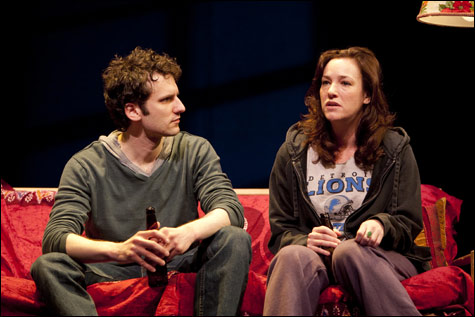
BECKY SHAW: Eli James and Wendy Hoopes mull the uncertainties of blind dates. |
You know upon meeting Becky Shaw that you're in the presence of a smart, snappy writer. But you picture playwright Gina Gionfriddo as someone more akin to Theresa Rebeck than William Makepeace Thackeray, whose Becky Sharp, the socially scheming heroine of Vanity Fair, inspired the eponymous co-protagonist of this contemporary comedy of morals, which is receiving a polished Boston premiere from the Huntington Theatre Company (at the BU Theatre through April 4). By the time the curtain falls, however, the ethical ground covered in Gionfriddo's acerb saga of a blind date gone wrong has wiggled like tectonic plates, and you are as disarmed as if she had wielded a faster gun than yours and barked, "Drop it!"
Of course, Becky Shaw is not Vanity Fair. It doesn't even purport to be satire: "I care too much about my characters to poke at them for the betterment of culture," Gionfriddo declares. But the play does have more on its mind than immediately meets the eye. A seemingly throwaway reference to the Greek concept of xenia is the key; one of the characters can't remember that word, but she does recall that the Greek gods "judge you by how well you treat the strangers who come to your door." And what else is a blind date?
Not that, in real life, anyone would set this one up. Suzanna is a thorny if fragile young woman whose father has recently died, and whose mother is taking it far too much in stride. Just months after the demise, Suzanna meets earnest, nurturing Andrew on a ski trip and promptly marries him — that on top of an ill-advised one-night stand with Max, the callous family financial adviser who, having been taken in by her wealthy parents as a child, is practically her brother. Now, Suzanna and Andrew have arranged a rendezvous between the cynical, successful Max and Andrew's co-worker Becky, a thirtysomething office temp with no money, little self-confidence, and a Sharpish hope of marrying up.
When the pair's date turns out to include robbery at gunpoint and its ramifications extend to stalking, blackmail, and suicide attempts, the net of social responsibility, with its knotty questions of money and class and just what we owe one another, entangles not just the dismissive Max and the desperate Becky but Suzanna and Andrew and even Suzanna's gigolo-towing mother. What's mom got to do with it? Well, Gionfriddo gives her every jaded line she can't stuff into Max's mouth, and the elegant Maureen Anderman delivers them with nonchalant acuity.
HTC artistic director Peter DuBois has shepherded this 2009 Pulitzer finalist since its premiere. Bringing Becky Shaw home to the Huntington, he presents it on a grander scale backed by a movable feast of sets by Derek McLane. And the show is well cast, with Keira Naughton a vulnerable Suzanna lurking behind a veneer of spoiled-little-girl shrewishness and Eli James her rumpled, responsible, co-opted husband. Seth Fisher spit-shines Max's blunt candor but also suggests the guy is not as Teflon as he affects to be. The apologetic yet persistent Becky is the most nebulous character, equal parts ingratiating loser and calculating player. It is to Wendy Hoopes's credit that she connects the dots between a Sally Field eager to be liked and a Glenn Close about to boil the bunny.